
Cancer, bloodsuckers, vultures . . . the imagery of corruption is biting and powerful, and it contains an essential truth: corruption eats away at its host and destroys the very thing it feeds on. You cannot be both patriotic and corrupt any more than you can be a law-abiding criminal. Corruption is always a betrayal of your country and fellow citizens.
guest opinion BY CATRIONA LAING

The cancer of corruption comes in many forms: soliciting or offering bribes to do what should be done anyway, taking kickbacks from contracts, awarding grossly inflated salaries, diverting natural resource revenues, reserving jobs for friends and family, or abusing the law to threaten rivals. The corrupt are endlessly creative and will never run out of ideas. The anti-corruption movement must match them with equally creative vigilance.
Wherever there is greed, and that is everywhere, then someone will try to misuse their privileges to make a dishonest dollar, pound or euro. We in Britain have our share of tax dodgers, expense fiddlers, price fixers, influence peddlers and money launderers. Every institution is vulnerable. From the administration of international football in Switzerland to the illegal building and collapse of a garment factory in Dhaka, Bangladesh, nothing is safe from corruption. That is why on December 9 we recognise the global Anti-Corruption Day. It’s a day on which we all should reflect on our responsibilities and redouble our own efforts in the anti-corruption movement.
And this is the key point to me: it is not the fact that corruption exists, it is what all of us do about it. We cannot wish corruption away, we can only suppress it with our constant attention, a relentless challenge, persistent demands for transparency and accountability and, above all, leadership.
Corruption can be very local — the sly back-hander or a bribe to jump a queue — but the biggest thieves rely on money moving silently and unseen across borders. And so the response is becoming stronger and more global. In the new international Sustainable Development Goals agreed in 2015, goal 16 is to promote just, peaceful and inclusive societies, and includes the objective to “substantially reduce corruption and bribery in all their forms”. The key to this is international co-operation. For example, the UN Convention against Corruption supports international asset recovery so that the corrupt have fewer places to hide their loot.
The Organisation for Economic Co-operation and Development (OECD) fights bribery in international business. Through its Anti-Bribery Convention, the OECD has taken the ethically bankrupt argument “if we don’t, our rivals will” head on by creating an agreement that covers nearly all major international businesses through their host governments.
The UK and Zimbabwe are working together through a double taxation agreement to root out tax evasion between the two countries. Zimbabwe is playing a leading role in the East and Southern African Money Laundering Group, of which the UK is also a partner.
- Chamisa under fire over US$120K donation
- Mavhunga puts DeMbare into Chibuku quarterfinals
- Pension funds bet on Cabora Bassa oilfields
- Councils defy govt fire tender directive
Keep Reading
The United Kingdom made anti-corruption efforts a priority for 2016. A major anti-corruption summit was held in May 2016 in London with a parallel event held here in Harare. At the Harare event, many young Zimbabweans spoke of their experiences of corruption and how economic turmoil creates the conditions for corruption to thrive. They expressed their frustration that Zimbabwe was lagging in the fight against corruption, and they worried that citizens were just starting to accept it as normal.
But it is not normal. The Constitution of Zimbabwe sets a clear national objective: “measures must be taken to expose, combat and eradicate all forms of corruption and abuse of power by those holding political and public offices”. This is a call to action for everyone in Zimbabwe, not just the government, to take on and drive out corruption. And it is for Zimbabwe’s friends, including the UK, to help where they can.
As one of the largest donors in Zimbabwe, we make it a priority to ensure that our projects are transparent and free of corruption.
We recognise that the main drive against corruption will come from Zimbabweans’ own efforts. To that end, we promote a more transparent, responsive, accountable, and inclusive governance system in Zimbabwe through support to projects led by civil society and other like-minded groups.
The Constitution established the Zimbabwe Anti-Corruption Commission (Zacc) to deliver on the promise to purge the nation of corruption, in the words of its motto to “refuse, resist, report”. We urge everyone touched by corruption to visit this body (www.accz.org.zw) and help to make this machinery work. In the face of corruption, Zimbabwe needs a trusted, robust and fair champion of the citizen. Government and the Commission itself have a responsibility, to ensure Zacc’s independence, and also to ensure that the independence is visible and that the commission is clearly distinct from party political and factional considerations.
While the government at every level of Zimbabwe must lead the fight against corruption, every citizen can do something. Everyone can be a citizen journalist, an anti-corruption activist. Everyone can refuse, resist and report. It is not only possible, it is essential.
Catriona Laing is the British ambassador to Zimbabwe











